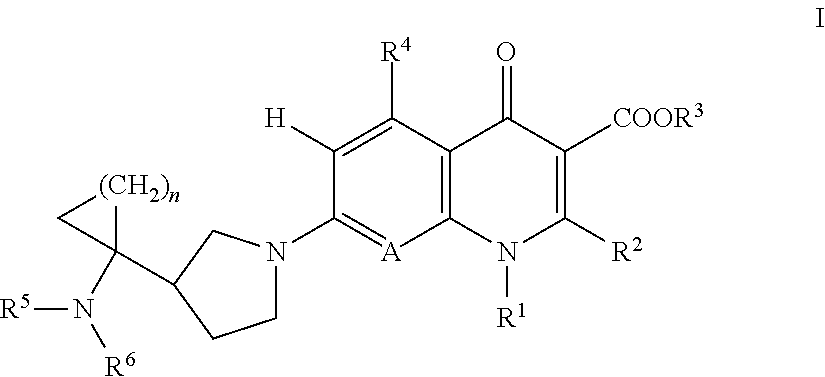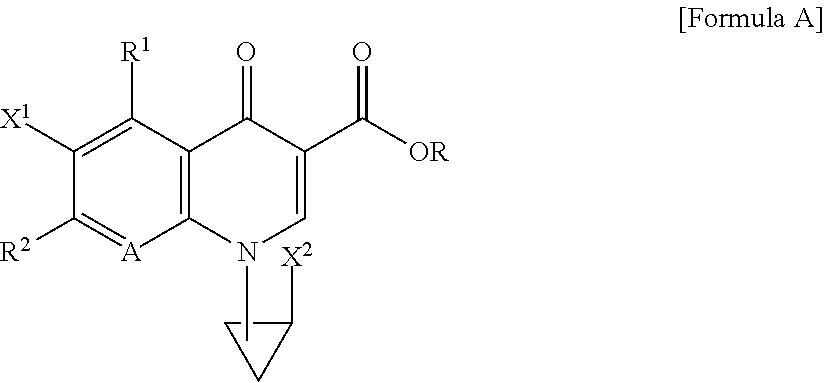Dehalogeno-compounds
a technology of halogeno-compounds and quinolones, which is applied in the direction of antibacterial agents, nitro compound active ingredients, drug compositions, etc., can solve the problems of difficult use as medical drugs or veterinary drugs, and the substitution of quinolone compounds having these substituents has not been put to actual clinical use, so as to achieve excellent antibacterial activity, excellent safety and pharmacokinetics, excellent
- Summary
- Abstract
- Description
- Claims
- Application Information
AI Technical Summary
Benefits of technology
Problems solved by technology
Method used
Image
Examples
reference example 1
Ethyl 2-(2,4-difluoro-3-methylbenzoyl)-3-dimethylaminoacrylate
[0239]2,4-Difluoro-3-methylbenzoate (4.97 g, 28.9 mmol) was dissolved in toluene (50 ml), and after adding N,N-dimethylformamide (0.1 ml) and thionyl chloride (3.16 ml, 43.4 mmol) thereto, it was stirred for 14 hours in an oil bath of 80° C. The reaction solution was then cooled and thereafter concentrated under a reduced pressure. After adding toluene to the residue and repeating concentration under a reduced pressure, the residue obtained was dissolved in tetrahydrofuran (10 ml). This solution was added dropwise while cooling with ice to a solution in which ethyl 3-dimethylaminoacrylate (4.97 g, 34.7 mmol) and triethylamine (5.04 ml, 36.1 mmol) were dissolved in tetrahydrofuran (20 ml). After completion of dripping, the reaction solution was heated under reflux for 10 hours. After completion of the reaction, the reaction solution was filtered, the triethylamine hydrochloride salt was removed (by diethyl ether washing), ...
reference example 2
Ethyl 7-fluoro-1-[2-(S)-fluoro-1-(R)-cyclopropyl]-1,4-dihydro-8-methyl-4-oxoquinoline-3-carboxylate
[0242]Ethyl 2-(2,4-fluoro-3-methylbenzoyl)-3-dimethylaminoacrylate (1.06 g, 3.57 mmol) was dissolved in tetrahydrofuran (15 ml), and after adding the para-toluenesulfonic acid salt of (1R,2S)-2-fluorocyclopropylamine (970 mg, 3.93 mmol), a solution, in which triethylamine (552 μl, 3.96 mmol) was dissolved in tetrahydrofuran (5 ml), was added dropwise under stirring at −15° C. After stirring the reaction solution for 2 hours at room temperature, potassium carbonate (740 mg, 5.36 mmol) and tetrabutylammonium chloride (49.6 mg, 0.179 mmol) were added, and this reaction suspension was heated under reflux while stirring for 5 days. After cooling the reaction solution, the tetrahydrofuran was evapolated under a reduced pressure. Dichloromethane (10 ml) was then added to the residue, and while cooling with ice and stirring, 2 mol / l hydrochloric acid was added dropwise gradually to adjust the ...
reference example 3
7-fluoro-1-[2-(S)-fluoro-1-(R)-cyclopropyl]-1,4-dihydro-8-methyl-4-oxoquinoline-3-carboxylic acid
[0245]Ethyl 7-fluoro-1-[2-(S)-fluoro-1-(R)-cyclopropyl]-1,4-dihydro-8-methyl-4-oxoquinoline-3-carboxylate (1.40 g, 4.56 mmol) was dissolved in acetic acid (4 ml), and after adding concentrated hydrochloric acid (4 ml) thereto, it was heated under reflux for 3 hours. After cooling, the reaction solution was poured into ice water (50 ml) and the precipitated crystals were filtered out. After washing the filtered-out crystals with an excess amount of water, washing in cold ethanol and washing in diethyl ether were performed in that order, and after drying under a reduced pressure, 1.18 g (93%) of the title compound was obtained in the form of a white powder.
[0246]1H-NMR (400 MHz, CDCl3) δ: 1.48-1.72 (2H, m), 2.75 (3H, t, J=2.56 Hz), 4.01 (1H, dd, J=2.81, 5.25 Hz), 4.83-4.84 and 4.98-5.00 (1H, dm, J=62.74 Hz), 7.31 (1H, dd, J=2.20, 8.79 Hz), 8.40-8.44 (1H, m), 8.84 (1H, d, J=2.69 Hz), 14.50 ...
PUM
| Property | Measurement | Unit |
|---|---|---|
| temperature | aaaaa | aaaaa |
| temperature | aaaaa | aaaaa |
| weight | aaaaa | aaaaa |
Abstract
Description
Claims
Application Information
 Login to View More
Login to View More - R&D
- Intellectual Property
- Life Sciences
- Materials
- Tech Scout
- Unparalleled Data Quality
- Higher Quality Content
- 60% Fewer Hallucinations
Browse by: Latest US Patents, China's latest patents, Technical Efficacy Thesaurus, Application Domain, Technology Topic, Popular Technical Reports.
© 2025 PatSnap. All rights reserved.Legal|Privacy policy|Modern Slavery Act Transparency Statement|Sitemap|About US| Contact US: help@patsnap.com



